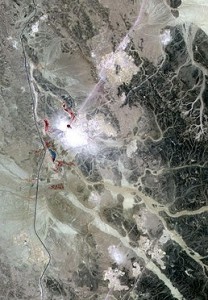WEDNESDAY, 2 MARCH 2011
Phosphorus is one of the fundamental elements in all living things. It is involved in regulatory processes and generating usable energy. Because of its vital role, phosphorus is used in fertilisers to replace nutrients lost from the soil and promote rapid plant growth and development. Unfortunately phosphorus-based chemicals are easily carried into lakes and rivers where they cause massive overgrowth of algae in the water. This is the start of a process called eutrophication which severely upsets the ecosystem by deoxygenating the affected bodies of water and killing off other aquatic organisms. The water may also become toxic to humans and other animals due to the growth of bacterial populations.Most phosphorus is mined from mineral deposits underground. Only a few locations have been found where it is possible to access these deposits and, as with coal and oil, there is only a limited amount available globally. Once these stores have been depleted they will take millions of years to regenerate. Scientists from the University of Wisconsin and McGill University have recently reviewed phosphorous use and suggest that phosphorus-containing fertilisers are often applied when they are not needed, resulting in the high levels of freshwater eutrophication seen in many places [1]. The team also theorise that continued phosphorus overuse my soon lead to partial deoxygenation of the oceans, with profound effects on wildlife worldwide. They state the importance of conservation and redistribution of remaining phosphorus reserves, but are unable to provide any long term solutions [2].
Written by Jonathan Lawson

